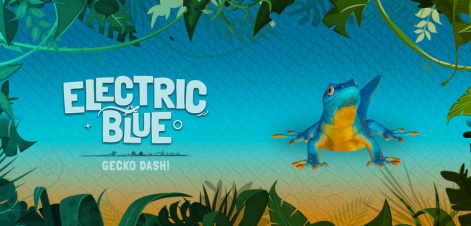While massively successful, the mobile games market is also wildly competitive, so it’s important for studios to understand where opportunities for growth can come from. One region that’s positioned for potentially massive growth is Africa.
The recent African Games Industry Report highlighted that Africa is home to nearly 200 million gamers spending primarily on mobile. Despite some challenges in the region regarding infrastructure and investment, a vibrant demographic of youthful players demands more games.
We spoke with Kenya-based Usiku Games producer Denis Odera to discuss the potential of the African games market and how he and his team are working to overcome the region’s challenges. In addition, Odera also shares details of Usiku Games’ upcoming title, Electric Blue: Gecko Dash! A game intended to be fun while educating players on the endangered species of the electric blue gecko.
PocketGamer.biz: Tell us a little about Usiku Games. How did things get started and any plans for the year ahead.
Denis Odera: Usiku Games is a game development studio based in Nairobi, Kenya. We were founded in 2018 and are committed to building a collection of mobile games that are ‘made in Africa, for Africa’. Each of our games is more than just fun to play; they are locally relevant, non-violent, gender inclusive, and most importantly have a positive impact on the world.
We believe in the #GamingForGood movement and its ability to create a powerful social impact in our communities, which is achieved through harnessing the power of fun to address some of the largest challenges facing society today. Some of these challenges include education, women’s empowerment, healthcare, agriculture, wildlife conservation and climate change.
Our ultimate goal as a studio, with the support of our parent company, the Pan Africa Gaming Group, is to continue our expansion and growth across Africa, bringing the GamingForGood movement to new communities and millions of new players.
Africa, as a continent, has more than a billion digital native youths, with more smartphones than the US, Canada and Mexico combined.
Denis Odera
Tell us more about gaming in Kenya and what game development looks like in the region.
Our location gives us a unique perspective on the world of game development compared to so many other regions. For example, the traditional world perception of Africa as a destination for charity is instead changing into a global source of innovation and culture.
Africa, as a continent, has more than a billion digital native youths, with more smartphones than the US, Canada and Mexico combined. These people have an average age of 20, offering up a vast pool of young talent ranging from coders and animators to writers and musicians. Each of these talented individuals is creating unique and culturally relevant content that resonates with not only local African audiences, but also global communities.
As a result, some African countries, such as Kenya, have established game development hubs and communities. This is something we’re committed to supporting at Usiku Games. We’ve already created the Nairobi Game Development Center, a 6,000 sqft community space that provides opportunities for collaboration, networking, and skill development among young and talented game developers.
However, despite this rapid and exciting growth in our industry, game development in Africa continues to face challenges such as limited access to funding, resources, and mentorship. Things like infrastructure issues, including reliable internet access, make it challenging for developers to be successful in some regions.
Although these challenges exist, there is a growing interest in game development in Africa, and we’re definitely on a positive upward trajectory regardless. There’s also continued support from both local and international communities, coupled with acknowledgement of challenges when it comes to infrastructure and education. All of this helps contribute to the sustained growth of the African development scene overall, so watch this space!
But the best thing about game development in Africa is that we’re creating an industry from a completely fresh canvas. We’re able to create and share games in a whole new way, ensuring that we’re more environmentally sustainable, equitable and inclusive overall, which is reflective of the true nature of Africa’s many local cultures and traditions.
As you mentioned, Africa has a vast number of mobile users. What do you think is the key to tapping into this audience?
With so many digital native youths across the continent, it’s perhaps not surprising that Africa represents the number one global market for young people in the 21st century. And in turn, gaming represents the number one channel for reaching those same young people with positive and socially impactful messaging.
The key to tapping into this market is to focus on developing games where players can see themselves reflected in the narratives and characters. Many developers are using their games as a way to reverse narratives around Africa’s colonial history and to help them celebrate their cultures. Usiku Games also achieves this by ensuring that all our content, from art to sounds and stories, is created by the community of local talent. This helps us, and the rest of the industry, instil a sense of pride.
We have a rare opportunity in Africa to shape our own ecosystem and reflect the value that we want to see in our games and communities. From inclusivity to gender equality and beyond, these are all things that make us proudly African.
The reality is that Africa’s digital infrastructure is rapidly expanding, with more than 470 million 4G connections in 2023, compared to just 100 million in 2020.
Denis Odera
Why do you think some still overlook the African market?
We first need to acknowledge the fact that, due to decades of charity-oriented poverty tropes, the common perception of Africa is that we’re all tribesmen living in thatched huts. This is also where the perception of technical restraints comes from. These are all things that have led to investors and games studios historically looking over the continent.
But, the reality is that Africa’s digital infrastructure is rapidly expanding, with more than 470 million 4G connections in 2023, compared to just 100 million in 2020. We’ve also got one of the fastest-growing middle classes globally, and, with over 600 million born after the year 2000, we’re a continent of digital natives that’s grown up with smartphones, social media and mobile games.
That’s a lot of change in just a few short years; what do you think about this growth for the African games market, and what are your predictions for the future?
There are already some early signs of massive growth coming to the African games market in response to an escalating interest in gaming across the continent.
Due to Africa’s rapidly growing smartphone adoption and income levels, combined with the continent’s young population, we believe that Africa will be one of the top three regions for the global games market over the next ten years only behind the USA and China.
The growth of the African games market is something our team is not only excited by, but we are also aware of the role we play in helping our industry move forward. As a founding studio within PAGG, Usiku Games is part of the largest game development group on the continent. We represent approximately 80% of the current game-creation ecosystem in Africa. As such, Usiku Games and PAGG have the opportunity and responsibility to shape this exciting new industry.
And about Usiku Games specifically, the team has recently developed a new mobile game, Electric Blue: Gecko Dash! The game is expected to launch in February this year. What can you tell us about the game and its development process?
Of course! Electric Blue: Gecko Dash! is a new casual mobile game that focuses on the Electric Blue Gecko, a real and critically endangered species that only exists in eight square kilometres of tropical forests at the eastern foothills of the Uluguru Mountains, Tanzania.
The game charts the journey of a lone electric blue gecko that a poacher has captured. The player must help the gecko escape the confines of its cage and find its way home to the crown of a screwpine tree in the nearby tropical forest. It’s designed to be fun and simultaneously build awareness about the threats posed to electric blue geckos in the wild, particularly highlighting poacher threats. The game is currently in soft launch and will be fully released in February 2024.

Over the course of nine months, we worked closely on the development of the game with both our sister studio, Kayfo Games, in Dakar, Senegal, and publisher OtE Productions. We honestly, couldn’t have hoped for a better collaboration. We always enjoy working with Kayfo Games, not only because of the amazing skills they bring to the projects but also because of the unique ideas and insights they bring from working together across such different cultures.
Similarly, both OtE Productions and its parent company, On the Edge, share our mindset, so it was clear that our visions aligned. We also respect On the Edge, making the honourable decision of ensuring that a game which focuses on an endangered species that only lives in East Africa was produced by a ground team in East Africa. There is a great philosophy that comes out of the accessibility movement: “Nothing About Us, Without Us”, and it’s great to see that practice in reality.
And finally, is there anything else we should be on the lookout for from Usiku Games or any final predictions/hopes for the games market in Africa?
Yes! We have some really exciting projects in the works for 2024. Outside of working with the Pan Africa Gaming Group to help create thousands of new jobs for young people across the content, we’ve got some really exciting games in development for this year.
We’ve just won an Epic MegaGrant for a game we’re working on called Shamba Showdown, which aims to address food security issues through a fun 3D African farming simulation mechanic. We’re also working on a rhythm-based mobile game called Usiku Beats, which will support and share the local vernacular music from various tribes across the continent.
You can discover more about the African games market at Pocket Gamer Connects. In this video from PGC Helsinki 2023 titled ‘Africa: The Next Frontier in Mobile Gaming’ Mahmoud El-Azzeh, VP of Product at Carry1st, talks about the potential of the region.

